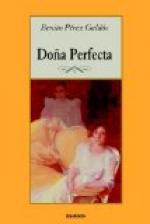“What a pity of the Cid Campeador!” said Dona Perfecta contemptuously. “Don’t you agree with me, Senor Penitentiary, that there is not a single man left in Orbajosa who has any shame in him?”
“That is a serious view to take of the case,” responded the capitular, without looking at his friend, or removing from his chin the hand on which he rested his thoughtful face; “but I think this neighborhood has accepted with excessive submission the heavy yoke of militarism.”
Licurgo and the three countrymen laughed boisterously.
“When the soldiers and the new authorities,” said Dona Perfecta, “have taken from us our last real, when the town has been disgraced, we will send all the valiant men of Orbajosa in a glass case to Madrid to be put in the museum there or exhibited in the streets.”
“Long life to the mistress!” cried the man called Vejarruco demonstratively. “What she says is like gold. It won’t be said on my account that there are no brave men here, for if I am not with the Aceros it is only because I have a wife and three children, and if any thing was to happen—if it wasn’t for that—”
“But haven’t you given your word to the governor, too?” said Dona Perfecta.
“To the governor?” cried the man named Frasquito Gonzalez. “There is not in the whole country a scoundrel who better deserves a bullet. Governor and Government, they are all of a piece. Last Sunday the priest said so many rousing things in his sermon about the heresies and the profanities of the people of Madrid—oh! it was worth while hearing him! Finally, he shouted out in the pulpit that religion had no longer any defenders.”
“Here is the great Cristobal Ramos!” said Dona Perfecta, clapping the Centaur on the back. “He mounts his horse and rides about in the Plaza and up and down the high-road to attract the attention of the soldiers; when they see him they are terrified at the fierce appearance of the hero, and they all run away, half-dead with fright.”
Dona Perfecta ended with an exaggerated laugh, which the profound silence of her hearers made still more irritating. Caballuco was pale.
“Senor Paso Largo,” continued the lady, becoming serious, “when you go home to-night, send me your son Bartolome to stay here. I need to have brave people in the house; and even with that it may very well happen that, some fine morning, my daughter and myself will be found murdered in our beds.”
“Senora!” exclaimed every one.
“Senora!” cried Caballuco, rising to his feet, “is that a jest, or what is it?”
“Senor Vejarruco, Senor Paso Largo,” continued Dona Perfecta, without looking at the bravo of the place, “I am not safe in my own house. No one in Orbajosa is, and least of all, I. I live with my heart in my mouth. I cannot close my eyes in the whole night.”
“But who, who would dare——”
“Come,” exclaimed Licurgo with fire, “I, old and sick as I am, would be capable of fighting the whole Spanish army if a hair of the mistress’ head should be touched!”




